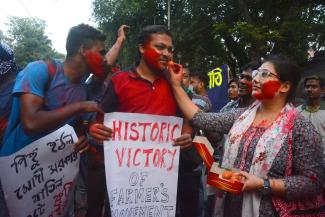Indian farmers’ victory
No, Narendra Modi is no liberal reformer

Wednesday’s Financial Times included an editorial comment which expressed regret, stating that Modi’s strongman approach to policy-making has undermined his agriculture reforms. In view of farmers’ determined long-term protests, Modi had announced the repeal of controversial farm laws a few days earlier. The FT suggested that Modi might have succeeded, if he had only engaged in broad-based public debate, formed alliances with various interest groups and brokered something like a national compromise on agriculture.
The FT’s stance was naïve in two ways:
- Modi specialises in aggressive identity politics and has so far shown no interest in anything that might resemble a national compromise.
- Brokering something of that kind in regard to farm subsidies is extremely difficult.
Let me briefly elaborate both points.
Modi has been in power since 2014. His track record proves that he is divisive, eager to pit communities against one another and declare anyone who does not support his idea of a Hindu nation as antinational, extremist and treasonous. In the early days of the Covid-19 Pandemic, his party, the BJP, and its followers did what they could to scapegoat Muslims, for example.
The BJP has created a personality cult according to which the prime minister is a wise and unfailing leader who crushes evil opponents. Nuanced negotiations with diverging interest groups in search of the common good might please the FT, but it would be plainly inconsistent with the Modi brand. It is telling that government propaganda has been portraying protesting farmers as Sikh extremists for months. The background is that many of the rallying farmers indeed belonged to this particular religious minority.
The problem with subsidised guarantee prices
My second point is more complex. As far as I can tell, India’s agriculture policies are not up-to-date. The basics of the current subsidy system were created when India desperately needed more food than the country’s farms were producing. As an incentive to stimulate production, the government introduced various subsidies. Among other things, it still guarantees minimum prices to farmers.
Economists agree that this approach can be useful in the short run to increase food supply, but becomes destructive in the long run. The main reasons are that it leads to overproduction and that rich farmers with large land holdings benefit disproportionately. If every bushel of wheat is subsidised with the same amount, those who produce most get the largest share of the subsidies.
The richest farmers thus get the most government support, but the needy struggle to eke out a living. That is nothing special in India, but typical of agriculture subsidies in many countries. Around the world, prosperous farmers tend to dominate politics in rural areas. Smallholders, sharecroppers and landless farm labourers normally accept their authority. To a large extent, they actually lack both the time to get personally involved in public affairs and the education they would need to understand complex subsidy systems.
I do not claim to have deep understanding of the current Indian subsidy system myself. It is obvious, however, that rural poverty remains a huge challenge in India and that guaranteed prices have not done much to reduce it. Modi’s reforms were supposed to expose agriculture to market forces. Food processors would have benefited in particular if rural commodities had become cheaper. However, rural communities – including the rural poor – felt threatened.
It is easy to draft a policy that opens up markets and ultimately favours those who buy farm commodities. It is, by contrast, very difficult to draft one that provides support to the rural poor whilst making dominant interest groups in rural areas accept some burdens. It can only happen if policymakers have a deep understanding of the social dynamics they are intervening in. Right-wing populists, however, generally do not pay much attention to policy details.
Sometimes divisiveness does not help
Modi is no exception. He unwittingly ran into the opposition of rural India and his divisiveness did not help him in this scenario.
For anyone who, like me, loves India but resents authoritarian governments, Modi’s failure is good news. It made the supposed strongman look weak. He was seen to be “out of touch” with rural people, and that may have a long-term impact. The big issues of farm subsidies and rural poverty, however, remain unresolved.
This blogpost is a marginally modified version of a comment we posted on LinkedIn earlier this week. If you like, join us there at d-c-development-and-cooperation
Hans Dembowski is the editor in chief of D+C/E+Z
euz.editor@dandc.eu












